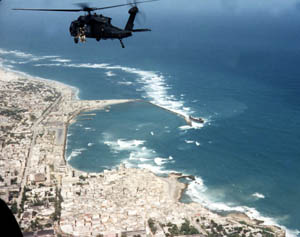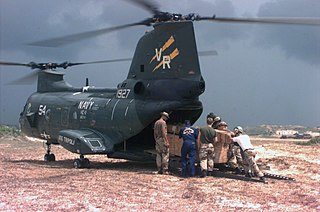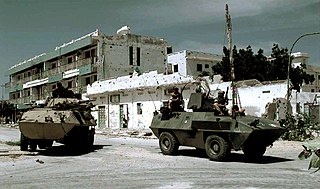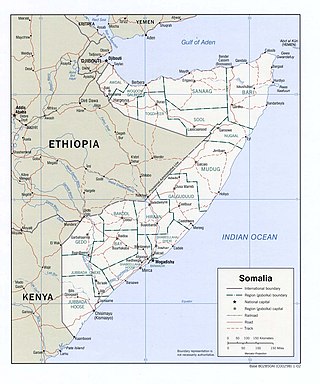
The Battle of Mogadishu, also known as the Black Hawk Down Incident, was part of Operation Gothic Serpent. It was fought on 3–4 October 1993, in Mogadishu, Somalia, between forces of the United States—supported by UNOSOM II—against the forces of the Somali National Alliance (SNA) and armed irregulars of south Mogadishu.

April Catherine Glaspie is an American former diplomat and senior member of the Foreign Service, best known for her role in the events leading up to the Gulf War.

Operation Gothic Serpent was a military operation conducted in Mogadishu, Somalia, by an American force code-named Task Force Ranger during the Somali Civil War in 1993. The primary objective of the operation was to capture Mohamed Farrah Aidid, leader of the Somali National Alliance who was wanted by the UNOSOM II in response to his attacks against United Nations troops. The operation took place from August to October 1993 and was led by US Joint Special Operations Command (JSOC).

The United Nations Operation in Somalia II was the second phase of the United Nations intervention in Somalia and took place from March 1993 until March 1995, following the outbreak of the Somali Civil War in 1991. UNOSOM II carried on from the transitory United States-controlled (UN-sanctioned) Unified Task Force (UNITAF), which had been preceded by UNOSOM I. Notably, UNOSOM II embarked on a nation-building mission, diverging from its predecessors. As delineated in UNSCR 814, the operation's objectives were to aid in relief provision and economic rehabilitation, foster political reconciliation, and re-establish political and civil administrations across Somalia.

Operation United Shield was the codename of a military operation, conducted 9 January to 3 March 1995, bringing a conclusion to the United Nations Operation in Somalia II. Commanded by the United States, two ships of the Pakistan Navy, five ships of the Italian Navy and six ships of the United States Navy formed a Combined Task Force (CTF) ensuring the safe evacuation of all UN Peacekeeping Forces from Somalia.

The Unified Task Force (UNITAF) was a United States-led, United Nations-sanctioned multinational force which operated in Somalia from 5 December 1992 until 4 May 1993. A United States initiative, UNITAF was charged with carrying out United Nations Security Council Resolution 794 to create a protected environment for conducting humanitarian operations in the southern half of the country.

United Nations Operation in Somalia I was the first part of a United Nations (UN) sponsored effort to provide, facilitate, and secure humanitarian relief in Somalia, as well as to monitor the first UN-brokered ceasefire of the Somali Civil War conflict in the early 1990s.
The Somali National Alliance was a major politico-military faction formed on 16 June 1992 by four different rebel groups that had been in opposition to the regime of former Somali President Mohamed Siad Barre. The SNA was the first major inter-clan and inter-factional political alliance and was considered to be among the most powerful factions of the Somali Civil War. The alliance would most notably face off against the second phase of the United Nations Operation in Somalia in the latter half of 1993.

United Nations Security Council resolution 775, adopted unanimously on 28 August 1992, after reaffirming resolutions 733 (1992), 746 (1992), 751 (1992) and 767 (1992) considering a report by the Secretary-General Boutros Boutros-Ghali on the ongoing civil war in Somalia, the Council decided to increase the strength of the United Nations Operation in Somalia I by an additional 3,000 personnel.

United Nations Security Council resolution 814, adopted unanimously on 26 March 1993, after reaffirming resolutions 733 (1992), 746 (1992), 751 (1992), 767 (1992), 775 (1992) and 794 (1993) on the ongoing civil war in Somalia, the council, acting under Chapter VII of the United Nations Charter, authorised an extension of the United Nations Operation in Somalia II until 31 October 1993.

United Nations Security Council resolution 865, adopted unanimously on 22 September 1993, after reaffirming resolutions 733 (1992), 746 (1992), 751 (1992), 767 (1992), 775 (1992), 794 (1992), 814 (1993) and 837 (1993), the Council addressed the process of national reconciliation and political settlement in Somalia, during the civil war.

United Nations Security Council resolution 878, adopted unanimously on 29 October 1993, after reaffirming resolutions 733 (1992), 746 (1992), 751 (1992), 767 (1992), 775 (1992), 794 (1992), 814 (1993), 837 (1993) and 865 (1993) on Somalia, the Council expressed its commitment to a future concerted strategy for the United Nations Operation in Somalia II and extended its mandate for an interim period until 18 November 1993.

United Nations Security Council resolution 885, adopted unanimously on 16 November 1993, after reaffirming resolutions 733 (1992), 746 (1992), 751 (1992), 767 (1992), 775 (1992), 794 (1992), 814 (1993), 837 (1993), 865 (1993) and 878 (1993) on Somalia and Resolution 868 (1993) on the safety of United Nations peacekeeping personnel, the council authorised the establishment of a Commission of Inquiry to investigate attacks on the United Nations Operation in Somalia II which led to casualties.

United Nations Security Council resolution 886, adopted unanimously on 18 November 1993, after reaffirming resolutions 733 (1992) and all of its subsequent resolutions on Somalia, the council discussed the situation in the country and renewed the mandate of the United Nations Operation in Somalia II until 31 May 1994.

United Nations Security Council resolution 897, adopted unanimously on 4 February 1994, after reaffirming resolutions 733 (1992) and 886 (1992) and all of its subsequent resolutions on Somalia, the Council discussed the role of the United Nations Operation in Somalia II in the peace process in the country.

United Nations Security Council resolution 923 was adopted unanimously on 31 May 1994. After reaffirming Resolution 733 (1992) and all of its subsequent resolutions on the situation in Somalia, the council addressed measures to resolve the situation and extended the mandate of the United Nations Operation in Somalia II until 30 September 1994.
United Nations Security Council resolution 946, adopted on 30 September 1994, after reaffirming Resolution 733 (1992) and all of its subsequent resolutions on the situation in Somalia, the council extended the mandate of the United Nations Operation in Somalia II for a period of one month until 31 October 1994.

United Nations Security Council resolution 954, adopted unanimously on 4 November 1994, after recalling Resolution 733 (1992) and all relevant resolutions on the situation in Somalia and a recent security council mission to the country, the Council noted the lack of progress in the peace process and decided, under Chapter VII of the United Nations Charter, to extend the mandate of the United Nations Operation in Somalia II for a final time, until 31 March 1995.

The Bloody Monday raid, also known as the Abdi House raid or Operation Michigan, was a US military operation that took place in Mogadishu on 12 July 1993, during the United Nations Operation in Somalia II phase of the UN intervention in the Somali Civil War. Carried out by American QRF troops on behalf of UNOSOM II, the raid was the war's deadliest incident in Mogadishu to that point and a turning point in the UN operation. It inflamed anti-UN and anti-American sentiments among Somalis, galvanizing the insurgency that the US military faced during the Battle of Mogadishu three months later.
The June 5th 1993 attack on the Pakistani military was a major confrontation that occurred concurrently in different parts of the Somali capital of Mogadishu, between Somali citizens & militias against the Pakistani peacekeeping contingent of UNOSOM II.
















